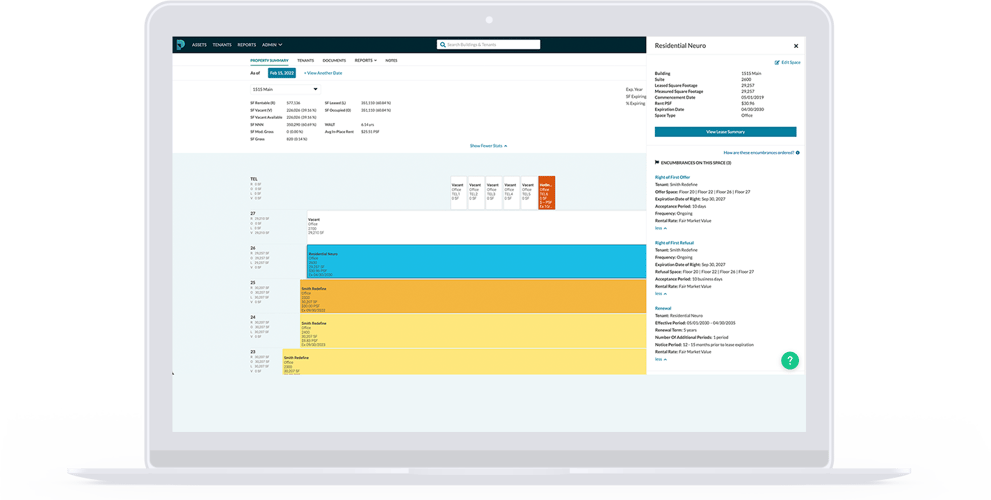Commercial Tenant & Landlord Representation: Day-to-Day Duties, Skills, and More
Tenant and landlord brokers play a very important role in CRE transactions as well as the success of their clients. Find out more about the respective responsibilities and duties of these two professionals.

Unlocking the complexities of commercial real estate, tenant representation and landlord representation brokers play critical roles in facilitating successful leasing transactions. With a profound understanding of local markets, property values, and lease regulations, these brokers act as invaluable guides for businesses and property owners alike.
While tenant reps advocate for the needs and preferences of tenants, landlord reps focus on attracting and retaining high-quality tenants to optimize property occupancy. Despite their shared goal of brokering favorable deals, both roles face unique challenges. Tenant reps must navigate occupant preferences and space availability, while landlord reps grapple with attracting tenants and managing cash flow.
However, by honing negotiation skills, maintaining client satisfaction, and leveraging technology, like Prophia's AI-powered software, both tenant and landlord reps can elevate their game and achieve remarkable success in the dynamic world of commercial real estate.
Jump To A Section in This Article
What is Landlord or Tenant Rep Brokering?
Key Responsibilities of Tenant and Landlord Brokers
Challenges of Landlord and Tenant Representation
Facilitating Better CRE Negotiations With Tenants
Skills & KPIs of Tenant & Landlord Reps
What is Landlord or Tenant Rep Brokering?
Tenant rep and landlord rep brokering are two highly important roles in commercial real estate, albeit, they are slightly different from one another. These brokers or agents represent either the property owner (landlords) or a tenant (business or individual looking to lease a space) throughout leasing or rental transactions.
Both landlord and tenant rep brokers have a very in-depth understanding of regional and local market trends, property values, and lease regulations. This market expertise helps both tenants and landlords navigate the complexities of CRE transactions and achieve deals that closely align with their client’s business goals. But because property owners and tenants have different motivations, they require different representation.
Landlord Brokers
Landlord representation works on behalf of the property owner (landlord) to find suitable tenants for their commercial spaces. The broker's role is to market the property, identify potential tenants, negotiate lease terms, and facilitate the leasing process. They aim to secure the best possible terms and rent for the landlord while ensuring the property is occupied by reputable and financially stable tenants.
Tenant Brokers
On the other hand, tenant representation involves a real estate broker or agent assisting businesses or individuals in finding and leasing suitable commercial spaces. The broker acts as an advocate for the tenant's interests, helping them identify properties that align with their specific needs and preferences. They negotiate lease terms on behalf of the tenant, aiming to secure favorable conditions and rental rates.
What Are Some Responsibilities of These Roles?
Due to the fact that tenant representation differs slightly from landlord representation, these CRE professionals have different responsibilities to successfully represent the business goals of the clients. But generally speaking, the shapes of the roles’ responsibilities hold some similarity. For instance, both tenant and landlord brokers engage in market analysis. Tenant representation will conduct market research to analyze rental rates and property values to advise a business or individual looking to lease space, landlord representation will hone in on rental rates as a means to gauge competition in the property owner’s market to aid in lease negotiation.
Both professionals will also handle aspects of lease negotiation for their clients. Where commercial tenant representation will negotiate to secure the best conditions for their clients, ensuring favorable rent agreements, lease duration and renewal options, a landlord representative will conduct lease negotiations on behalf of the landlord to also ensure property owners secure the most favorable rent rates and term duration. When it comes to renewals, a landlord rep will handle renewal negotiations with the property owner’s existing tenants and negotiate terms to incentivize them to renew their contracts while also securing their clients a more favorable lease.
Where the paths of these two roles diverge slightly is along the lines of client advocacy and representation. For example, a tenant broker will take part in a needs assessment to understand the specific requirements of a tenant. Throughout this close, working relationship, tenant representatives learn specifics about their client’s location preferences, commercial space requirements, budget, and business requirements. Tenant brokers will then use this information to conduct property searches to find the commercial space that fits their client’s unique needs.
While tenant rep brokers are conducting property searches, landlord representatives will conduct tenant screenings and run complex background checks on the financial sustainability and stability of prospective tenants. Landlord reps use their market knowledge to find and broker deals with tenants that hold the greatest economic value for the property owners they represent. This is a fundamentally different approach to the market than brokers who represent tenants.
What Are Challenges of Representation Brokering?
Tenant and landlord brokers both have one central goal: to effectively represent their clients and broker a deal that supports their business goals. For commercial tenant reps, some role challenges include managing competing demands, anticipating and mitigating market fluctuations, limited availability, tight timelines and time constraints, understanding complex lease terms, and helping businesses through relocations and performing a part of commercial due diligence.
For landlord brokers, for these professionals, attracting high-quality tenants can be very difficult, particularly in markets where competition is high or when markets are facing suppression. Additionally, landlord brokers also deal with vacancy and cash flow, as vacancies can affect their property owner’s ROI. Landlord reps must make it a priority to minimize vacancies and ensure a property remains occupied with tenants.
What’s more, landlord reps can face significant challenges in their roles when the market is unstable. Value fluctuations can make it very tenuous to renegotiate terms with existing tenants. Particularly, if those tenants are also struggling due to the economic conditions of the market. In this case, if tenants begin to leave properties, this could lead to high turnover and which can also pose significant challenges for landlord brokers.
Facilitating Renegotiations With Confidence and Ease
Renegotiations are a powerful tool for brokers representing commercial landlords and tenants because it gives both parties an opportunity to change disadvantageous lease agreements for more favorable ones that could put the tenant or landlord in a better financial standing.
For landlord brokers in particular, it is extremely important to stay on top of encumbrances and critical dates in their clients’ tenants’ leases. Missing just one of these critical dates or a renewal condition can be costly from a legal and financial perspective. And as many firms continue to navigate their leasing strategy in down-markets, repeated missed critical dates or lackluster negotiations can leave property owners vulnerable.
With Prophia, CRE professionals can strengthen their negotiation power and preparedness using AI-powered features like critical dates tracking and dynamic portfolio reports capable of projecting rent steps and future vacancies at the tenant-level.
Landlord reps can also review a detailed property summary within Prophia’s stacking plan, which generates automatically from the uploaded tenant leases. The stacking plan makes it simple and immediate to compare tenant data and compose a holistic picture of a specific property’s leasing schedule for the coming year and any relevant future dates.
Prophia’s stacking plan data syncs directly with the original tenant lease documents, making it simple to review specific terms and uncover any inconsistencies. This data-first approach allows Prophia to enhance the abilities of any landlord rep, leading to stronger negotiations, transparency, and a holistic view of the properties they represent.
Notable Skills & Success Metrics of Landlord and Tenant Reps
To effectively represent and convey the needs of their clients, tenant and landlord reps need to be expert communicators with strong market knowledge. Landlord reps need to have a comprehensive understanding of markets in order to secure favorable rent rates for their clients. Additionally, commercial landlord brokers must be the best advocates for their properties and understand how to position their properties in the market to attract the high quality tenants.
This skill requirement also calls into necessity the ability to build strong relationships with their clients and develop a nuanced understanding of their business needs. Having this in-depth knowledge is key for walking into renewal negotiations and steering the deal effectively to benefit the property owner while also incentivizing the tenant to renew their contract.
Because these are some of the required skills, common success metrics for landlord and tenant representation often include the time it takes to strike a deal, or time to lease, the goal being to quickly find and secure a suitable property for a tenant or close a deal with a high quality tenant to fill a vacancy. Landlord reps also measure performance through the number of successful renewals they oversee, often referred to as their lease renewal rate. A high lease renewal rate suggests a property’s tenants are satisfied and the landlord representative is a skilled negotiator.
Landlord brokers also measure success through rental income and their property’s occupancy rate. Consistent, high occupancy and tenants who never miss a rent payment indicate that a landlord rep has successfully identified financially viable tenants for their clients and are effectively monitoring the tenants’ rent schedules throughout the duration of their lease agreements and renewals.
If any of these data struggles or role-specific requirements ring true for you and your team, it might be time to integrate a vertical AI solution into your techstack. Get started by exploring Prophia’s AI solution in under a minute in the video above, or reach out to a member of our team to schedule a personalized demo.
Hannah Overhiser
Hannah is Prophia's Content Marketing Manager and a seasoned B2B and B2C marketer. Her career began in eCommerce consulting with a focus on code testing. This technical expertise transferred seamlessly to SEO and she started working agency-side as an SEO and Content Strategist. Today, her home is Prophia, and she puts...


